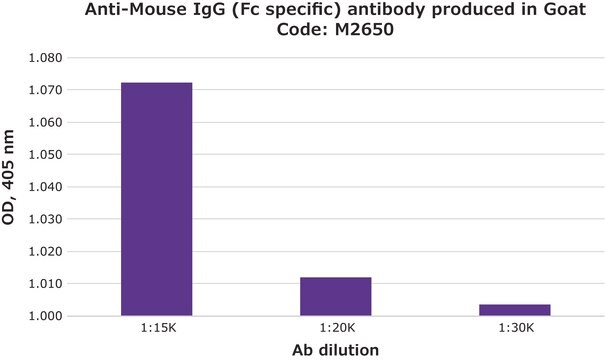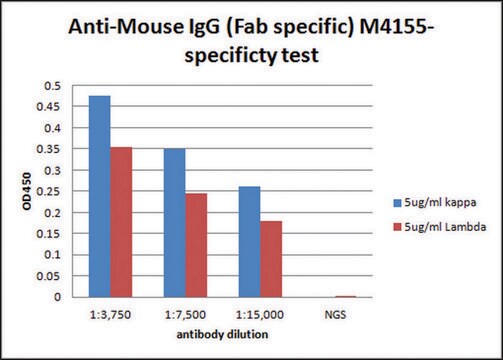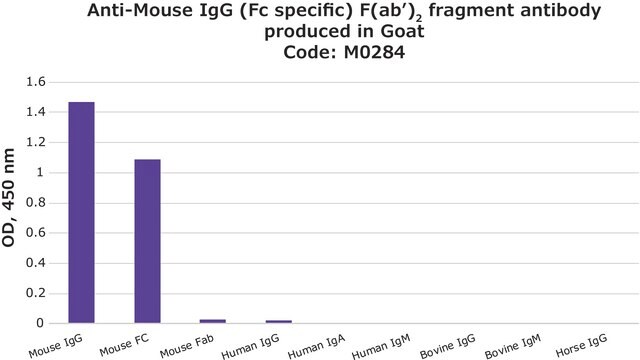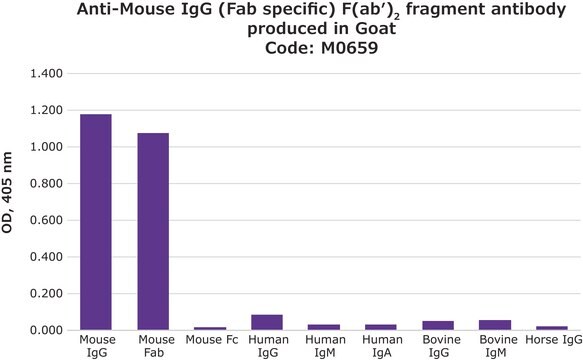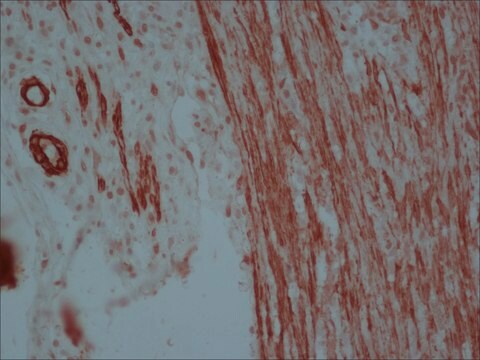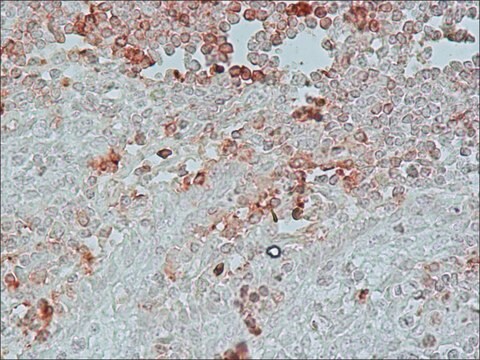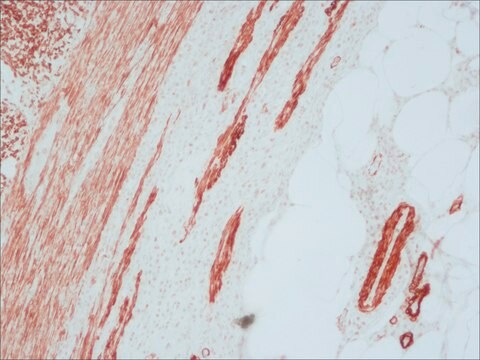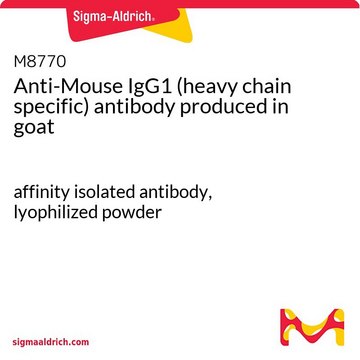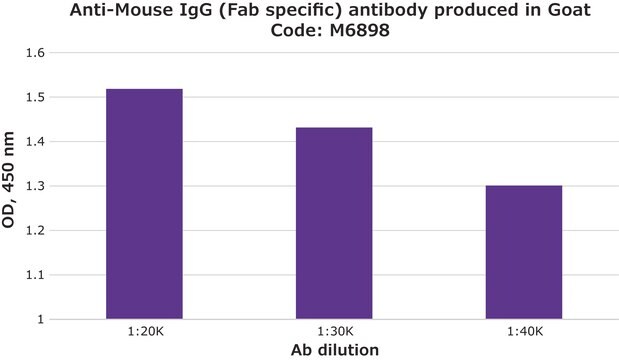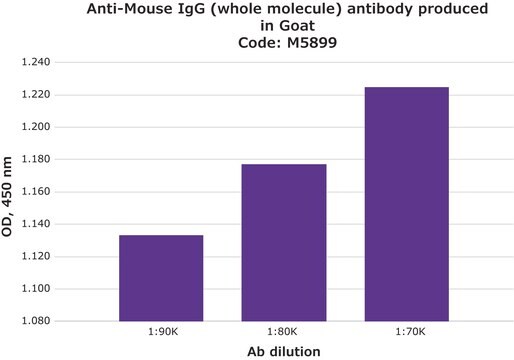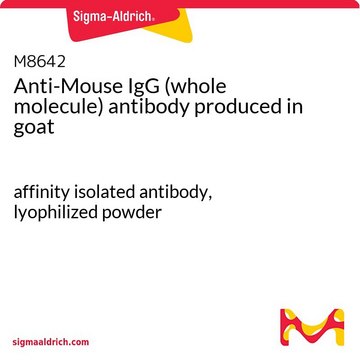M3534
Anti-Mouse IgG (Fc specific) antibody produced in goat
2.0 mg/mL, affinity isolated antibody
Sign Into View Organizational & Contract Pricing
All Photos(1)
About This Item
Recommended Products
biological source
goat
Quality Level
conjugate
unconjugated
antibody form
affinity isolated antibody
antibody product type
secondary antibodies
clone
polyclonal
concentration
2.0 mg/mL
technique(s)
indirect ELISA: 1:15,000
shipped in
dry ice
storage temp.
−20°C
target post-translational modification
unmodified
Looking for similar products? Visit Product Comparison Guide
Related Categories
General description
IgG subtype is the most abundant serum immunoglobulins of the immune system. It is secreted by B cells and is found in blood and extracellular fluids.
Immunogen
Mouse IgG, Fc fragment
Application
Anti-Mouse IgG (Fc specific) antibody has been used in:
- enzyme linked immunosorbent assay (ELISA)
- Ouchterlony double diffusion
- anti-drug antibody immunoassay
- immunoelectrophoresis
Biochem/physiol Actions
Immunoglobulin G (IgG) is a glycoprotein antibody that regulates immune responses such as phagocytosis and is also involved in the development of autoimmune diseases . Mouse IgGs have four distinct isotypes, namely, IgG1, IgG2a, IgG2b, and IgG3. IgG1 regulates complement fixation in mice
Other Notes
Antibody adsorbed with human IgG and rat serum proteins
Physical form
Solution in 0.01 M phosphate buffered saline, pH 7.4, containing 15 mM sodium azide.
Preparation Note
Adsorbed to reduce background with human or rat samples.
Disclaimer
Unless otherwise stated in our catalog or other company documentation accompanying the product(s), our products are intended for research use only and are not to be used for any other purpose, which includes but is not limited to, unauthorized commercial uses, in vitro diagnostic uses, ex vivo or in vivo therapeutic uses or any type of consumption or application to humans or animals.
Not finding the right product?
Try our Product Selector Tool.
Storage Class
10 - Combustible liquids
wgk_germany
WGK 3
flash_point_f
Not applicable
flash_point_c
Not applicable
Choose from one of the most recent versions:
Already Own This Product?
Find documentation for the products that you have recently purchased in the Document Library.
Customers Also Viewed
Integrating molecular detection and response to create self-signalling antibodies
Randle B, et al.
Biochemical and Biophysical Research Communications, 324(2), 504-510 (2004)
Universal immunoassay applied during early development of large molecules to understand impact of immunogenicity on biotherapeutic exposure
Bautista AC, et al.
The APPS Journal, 14(4), 843-849 (2012)
N Ban et al.
British journal of cancer, 101(2), 363-371 (2009-06-11)
The essential aetiology of radiation-induced acute myeloid leukaemia (AML) in mice is the downregulation of the transcription factor PU.1. The causative mutation of the PU.1-endocing Sfpi1 gene consists mostly of C:G to T:A transitions at a CpG site and is
Nathan H Joh et al.
Journal of pharmaceutical sciences, 109(1), 845-853 (2019-10-20)
Silicone oil is a lubricant for prefilled syringes (PFS), a common primary container for biotherapeutics. Silicone oil particles (SiOP) shed from PFS are a concern for patients due to their potential for increased immunogenicity and therefore also of regulatory concern.
Development and validation of a standardized ELISA for the detection of soluble Fc-epsilon-RI in human serum
Lexmond W, et al.
Journal of Immunological Methods, 373(1-2), 192-199 (2011)
Our team of scientists has experience in all areas of research including Life Science, Material Science, Chemical Synthesis, Chromatography, Analytical and many others.
Contact Technical Service

